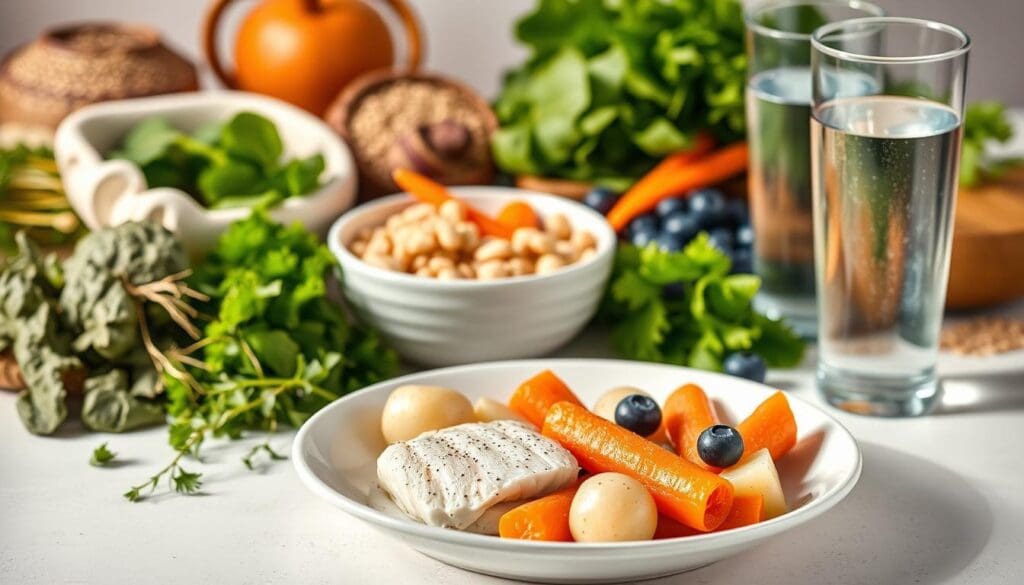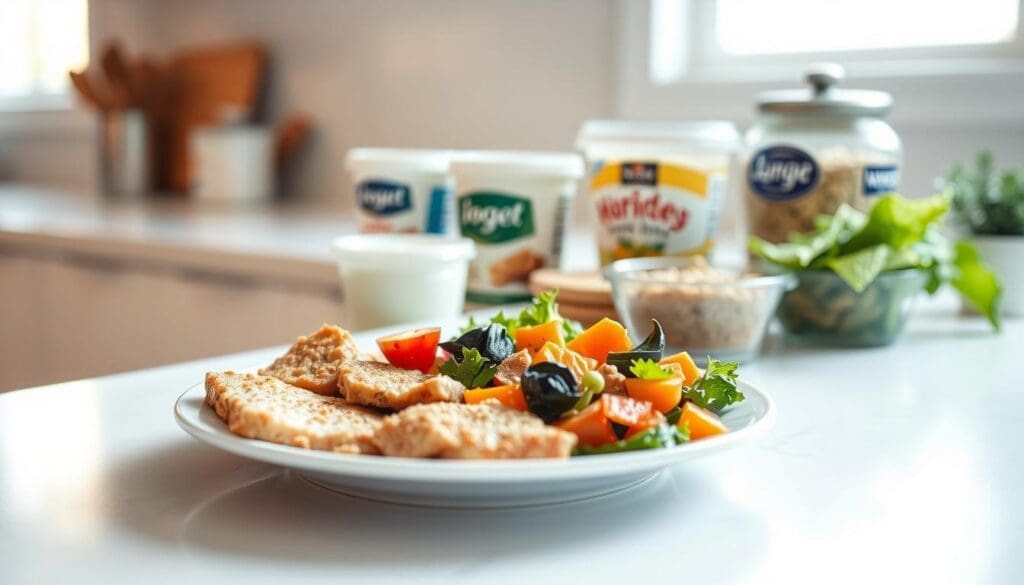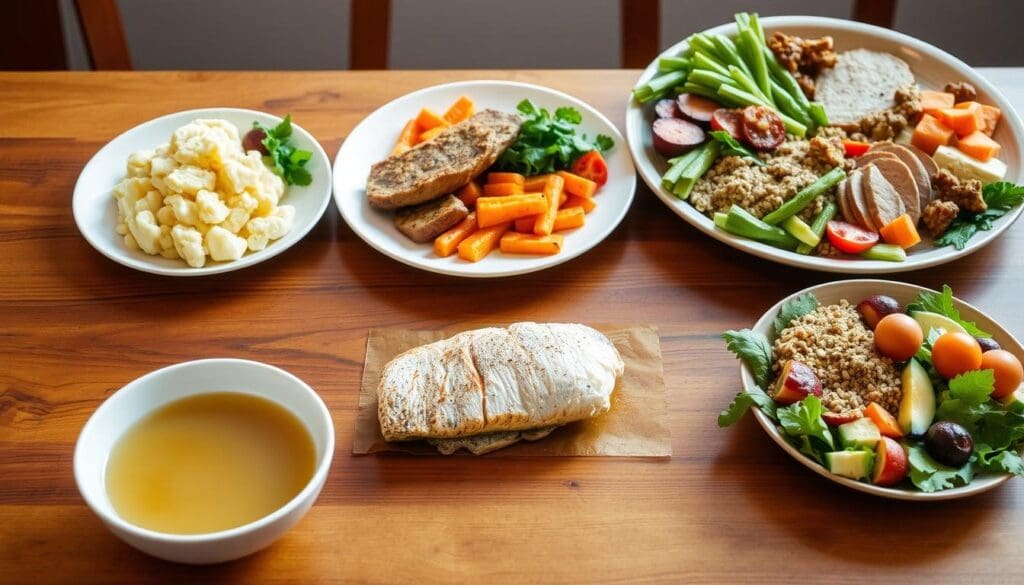Last Updated on November 26, 2025 by Bilal Hasdemir
Recovering from colon surgery means paying close attention to what you eat. A good diet is key for healing and avoiding problems. Doctors suggest starting with clear liquids and then moving to soft, easy-to-digest foods.

At Liv Hospital, we know how important a smooth recovery is. Our team, led by We’ll show you the best foods to eat after colon surgery to help you recover well.The right diet after colon surgery is essential. Get 13 of the best foods to eat for a smooth, safe, and fast recovery.
Proper nutrition is key after colon surgery. It helps in healing and reduces complications. The body needs the right nutrients to recover well.
Colon surgery can change how your digestive system works. The colon helps absorb water and salts from food. It also forms stool. Surgery might make it hard for the colon to digest food properly, leading to diarrhea or constipation.

Nutrition is vital for healing after colon surgery. It gives the body what it needs to repair tissues, keep energy up, and boost the immune system.
| Nutrient | Role in Recovery | Food Sources |
| Protein | Tissue repair and healing | Lean meats, fish, eggs, dairy |
| Carbohydrates | Energy source | Whole grains, fruits, vegetables |
| Vitamins and Minerals | Immune support and overall health | Fruits, vegetables, nuts, seeds |
Eating a balanced diet with these nutrients helps the body heal. It also lowers the risk of complications after surgery.
Knowing how to progress your diet after colon surgery is key for a good recovery. The diet changes help your digestive system heal without stress. We’ll walk you through the diet stages, from clear liquids to soft foods.
The first step after surgery is a clear liquid diet. This stage is important to keep your digestive system calm and avoid problems. Clear liquids like broths, clear juices, and gelatin are easy to digest. It’s important to drink plenty of fluids during this time.
As you get better, you’ll move to a full liquid diet. This includes all clear liquids plus thicker liquids like milk, yogurt, and strained soups. The goal is to add more calories and nutrients without stressing your digestive system.

The last stage before you can eat normally is the soft food stage. You’ll eat foods that are easy to chew and swallow, and are gentle on your digestive system. Examples include mashed potatoes, scrambled eggs, and cooked vegetables.
It’s important to follow your healthcare provider’s advice on diet progression for a smooth recovery. The diet after colon surgery is designed to support healing and reduce discomfort.
Clear liquids are key in the early stages of recovery after colon surgery. They offer important nutrients without upsetting the stomach. It’s important to pick liquids that are easy to digest and full of nutrients to help with healing.
We suggest choosing clear liquids that are gentle on the stomach and packed with nutrients. These liquids help keep you hydrated and give you the essential electrolytes you need.
Broth and clear soups are great choices in the early recovery phase. They are soothing and full of salts and electrolytes. Chicken or vegetable broth are especially good because they’re easy to digest and full of nutrients.
“A clear broth or soup can be a comforting and nutritious choice after surgery, offering vital electrolytes and hydration.”
Make sure the broth or clear soups you choose are free of solids and not too hot or cold. Here are some key benefits:
| Type of Broth | Nutritional Benefits | Precautions |
| Chicken Broth | High in protein, electrolytes | Avoid if allergic to chicken |
| Vegetable Broth | Rich in vitamins, minerals | Check for any vegetable allergies |
Gelatin and clear juices are also great choices. Gelatin is a good protein source, and clear juices give you essential vitamins and minerals. Apple or grape juice are good because they’re gentle on the stomach.
When you’re eating gelatin or clear juices, pick products that are low in sugar and without pulp or sediment. Here are some benefits:
In conclusion, broth, clear soups, gelatin, and clear juices are key parts of a clear liquid diet after colon surgery. They give you the nutrients, hydration, and electrolytes you need in the early recovery phase.
Gentle foods are key in helping you recover after colon surgery. They give you the nutrients you need. As you move from clear liquids, these foods are easier to digest. They help you get to more solid foods.
Applesauce is great for early recovery. It’s easy to digest and full of nutrients. It has antioxidants and fiber, but less fiber because it’s cooked. It’s a good energy source and gentle on your stomach.
White toast is another good choice for your stomach. It has simple carbohydrates that turn into energy fast. This helps your body heal. It’s also low in fiber, which is good for your stomach early on.
Bananas are full of nutrients and easy to digest. They’re a great source of potassium, which you lose after surgery. They give you gentle energy and help keep your nutrition balanced.
These foods are very important in the early recovery stages. They give you the nutrients you need and are easy on your stomach. As you get better, you can try more foods. Always watch how your body reacts to new foods.
After colon surgery, your body needs enough protein to heal. Protein helps rebuild and strengthen tissues. Eating foods high in protein can help you recover faster.
Eggs are packed with protein and all nine essential amino acids. They’re also easy to digest, making them great for recovery after surgery.
Skinless chicken is a lean protein that’s easy on your stomach. It helps repair tissues without causing irritation.
White fish like cod or tilapia is full of protein and omega-3 fatty acids. These nutrients boost your health and help with healing.
Low-fat yogurt offers protein and probiotics. Probiotics keep your gut healthy, which is key after colon surgery.
| Food | Protein Content (per serving) | Other Nutrients |
| Eggs | 6-7 grams per large egg | Rich in vitamins B2, B12, and D |
| Skinless Chicken | 26-30 grams per 3 oz serving | Good source of niacin and vitamin B6 |
| White Fish | 20-24 grams per 3 oz serving | Rich in omega-3 fatty acids and selenium |
| Low-Fat Yogurt | 10-15 grams per 6 oz serving | Contains probiotics, calcium, and vitamin D |
Carbohydrates are key for energy during recovery after colon surgery. Our bodies need energy to heal. Carbohydrates help us regain strength and get back to normal.
Some carbs are better than others at the start of recovery. We suggest choosing easy-to-digest carbs for energy without discomfort.
White rice is a top choice for recovery. It helps with loose stools, a common problem after surgery. White rice is easy to digest, perfect for starting solid foods.
Well-cooked pasta is another good energy source. Cooking pasta until it’s soft makes it easier to digest. It’s a great option for adding variety to meals.
White rice and well-cooked pasta are great for colon surgery recovery. They give energy and are gentle on the stomach, helping recovery.
As you get better, adding the right veggies to your diet is key. They give you the nutrients you need and help your body heal. Start with veggies that are easy on your stomach.
Well-cooked carrots are great for recovery. They’re full of vitamins and minerals, like vitamin A. This vitamin helps with healing and keeping your immune system strong. Cooking them until they’re soft makes them easy to digest.
Nutritional Benefits of Well-Cooked Carrots:
| Nutrient | Benefit |
| Vitamin A | Supports healing and immune function |
| Fiber | Aids in digestion and bowel regularity |
| Antioxidants | Protects cells from damage |
Steamed spinach is also good as you get better. It’s full of iron, which is good for your blood cells. It also has folate and vitamins. Steaming it makes it soft and easy to digest.
Nutritional Benefits of Steamed Spinach:
| Nutrient | Benefit |
| Iron | Essential for healthy red blood cells |
| Folate | Important for cell division and growth |
| Vitamins | Supports overall health and well-being |
Adding well-cooked carrots and steamed spinach to your diet helps a lot after colon surgery. They give you important nutrients, are gentle on your stomach, and help you stay healthy.
Knowing which foods to avoid after colon surgery is key to a smooth recovery. Your digestive system needs time to heal. Some foods can cause discomfort or problems if not chosen carefully.
High-fiber foods are good for health but hard on your digestive system right after surgery. It’s best to limit or avoid foods like:
These foods are high in fiber. They can be hard to digest and may cause gas, bloating, or discomfort.
Some foods can irritate your digestive system or cause discomfort after surgery. It’s wise to limit or avoid:
Limiting these foods can help avoid complications and support your recovery.
As you get better, you can slowly add back foods you’ve been avoiding. It’s important to do this slowly and watch how your body reacts. We recommend:
| Food Group | When to Reintroduce | How to Reintroduce |
| High-Fiber Foods | 2-4 weeks post-surgery | Start with small portions and cooked versions |
| Spicy Foods | 3-6 weeks post-surgery | Begin with mildly spicy dishes and gradually increase |
| High-Fat Foods | 4-6 weeks post-surgery | Reintroduce in moderation, monitoring for discomfort |
Slowly adding back foods helps your digestive system adjust. It also lowers the risk of complications.
Being mindful of your diet and avoiding certain foods after colon surgery supports your recovery and health. Always talk to your healthcare provider for personalized dietary advice.
Managing your diet after colon surgery is key to healing well. It’s important to have guidelines that meet your nutritional needs during recovery.
Eating smaller meals more often can ease digestive issues and ensure you get enough nutrients. Try to have 4-6 small meals a day instead of three big ones.
Nutritional Tips:
| Meal Frequency | Portion Size Guidance | Nutritional Tips |
| 4-6 meals/day | Start small, increase gradually | Choose nutrient-dense foods |
| Spread out every 2-3 hours | Listen to your body’s hunger cues | Avoid high-fiber foods initially |
Drinking enough water is vital for recovery. It helps prevent constipation and supports your body’s functions. Try to drink 8-10 glasses of fluid a day, unless your doctor tells you otherwise.
Hydration Tips:
It’s important to watch how your body reacts to different foods and fluids. Keep an eye out for symptoms like bloating, gas, or discomfort.
Monitoring Tips:
By following these tips, you can manage your diet after colon surgery better. This will help support your recovery.
As we wrap up our guide on the best foods after colon surgery, it’s clear that a good diet is key. Understanding the diet progression, eating gentle, nutrient-rich foods, and avoiding irritants helps a lot. This supports your healing.
Following a clear liquid diet first and then moving to solid foods is crucial. Foods like eggs, skinless chicken, and white fish help with healing. They provide the protein needed for tissue repair.
By sticking to these diet tips and staying hydrated, you can make smart food choices after surgery. We’re here to offer top-notch healthcare and support. We help you through the recovery process with confidence.
Start with clear liquids after colon surgery. Then, move to full liquids and soft foods. This helps your digestive system heal.
Clear liquids like broth and clear juices are good. They’re easy on your stomach and provide nutrients.
Try foods like applesauce and bananas. They’re easy to digest and give you the nutrients you need.
Eggs and white fish are great for protein. They’re gentle on your stomach and help you heal.
White rice and pasta are good carbs. They give you energy and are easy to digest.
You can try cooked carrots and spinach later. They’re rich in nutrients and gentle on your stomach.
Avoid high-fiber foods and irritants at first. Know when to add them back for a balanced diet.
Eat small meals and drink plenty of water. Watch how your body reacts to food. These tips help your recovery.
Your long-term diet depends on your health and what your doctor says. Aim for a balanced diet with lots of nutrients.
Eat clear liquids, soft foods, and protein sources like eggs. Include carbs like white rice too.
Pay attention to how your body reacts to food. If you feel bad, talk to your doctor.
Muleta, J., et al. (2024). A rare case of bile leak due to type 2 duct of Luschka injury: Diagnosis and intervention. Journal of Surgical Case Reports. Retrieved from https://academic.oup.com/jscr/article/2024/3/rjae179/7632948
Subscribe to our e-newsletter to stay informed about the latest innovations in the world of health and exclusive offers!